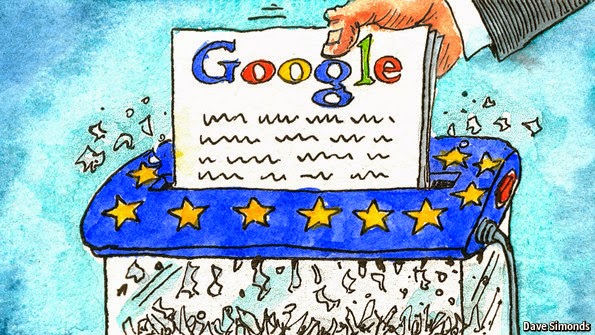

European Union wants to censor search results globally
This is getting ludicrous.
Originally shared by Mike Elgan
The European Union wants to censor Internet search engines globally!
EU regulators summoned three American search engines (and no European ones) reportedly to admonish them for failing to censor themselves globally, rather than just in Europe, over the “right to be forgotten” ruling, according to some media reports. They’re also reportedly telling Google to keep quiet about the censorship and not tell the sites that are affected.
Censorship: “The change in the access status of material, made by a governing authority or its representatives. Such changes include: exclusion, restriction, removal, or age/grade level changes.” -American Library Association
Join me, as well as co-host Jason Howell and guest co-anchor Christina Warren (Mashable), plus our interview guests Aoife White (Bloomberg), Reed Albergotti (The Wall Street Journal) and Cat Zakrzewski (TechCrunch) as we talk about the EU’s right to be forgotten moves, Facebook’s earnings, Twitter’s diversity, Apple’s Wallet and more!!
Watch now: http://twit.tv/tnt/1056
Subscribe to the audio version of TNT on Feedly:
http://feedly.com/index.html#subscription%2Ffeed%2Fhttp%3A%2F%2Ffeeds.twit.tv%2Ftnt.xml
(Pic props to The Economist: http://goo.gl/E0VAGx )
#RightToBeForgotten #TechNewsToday #TNT #TWiT


Alan Stainer if you mean Americans complaining about protecting privacy then it is ludicrous.
The ‘right to be forgotten’ is far from ludicrous though and is certainly not censorship
Consider this scenario and I have to be very careful here because it will get indexed by Google.
I write a web page on one of my sites that is indexed by Google that makes false accusations about either you or Mike Elgan
It has a well crafted meta description that includes those accusations which appears in Google search.
Once Google have it indexed then I take the page down.
Now having got the page into the google index with false accusations then it stays there even if the page has gone.
That means a search on name is liable to turn up my false accusation against the name searched for. Clicking it will get a 404 but the damage is done from what I crafted in to the result that a google search returns.
The ‘right to be forgotten’ is an attempt to address this. It may well be flawed in its current form but it is certainly very from removed from censorship as Mike Elgan claims.
Ian Dixon it is ludicrous, because it is so damn flawed at the moment and now they want to apply the ruling globally?
For instance, if you submit a right to be forgotten, it is up to Bing and Yahoo and Google and all the other search engines to interpret the ruling separately. So, while Google may take something down, Bing may not. Secondly, the fact the ruling applies to search results at all is looking at the issue from the wrong angle. The offending web content should be removed if there is a valid and legal reason to do so. Search results will catch up with 404 errors over a relatively short period of time. However, the way it stands at the moment, the content is still there and is still indexed and you can find it.
Oh and apparently they want search engines (Google) to stop displaying messages on search results informing people that content may have been removed and they want to stop them from informing the webmasters of the affected websites?
The whole thing feels rushed to me and it feels like it has been rushed by an ignorant and misguided few in Europe.
Alan Stainer I wonder if those the other side of the pond would be making such a fuss about this if it had come from the US Supreme Court rather than the ECJ? I think not.
Google already acts as an internet censor by choosing what to index and how to order the results. An example here would be one site that I am involved with that lost most of the search traffic to several pages in the recent updates. Google have censored that site.
Googlebot may catch up on some 404s but certainly misses plenty. I’ve followed numerous links to a dated page that gives one. The result in the Google index can stay around for a long time after the page is gone.
Now the US has the DMCA and Google is quick to respond to takedown requests that use that. It is a form of censorship because the requestor really just has to ask rather than prove. Is that any different to RTBF?
The problem we face is that legislators generally lack an understanding of how the internet works. Because of that, RTBF is undoubtedly flawed but it is far from being a ludicrous concept
The problem is not just that it is flawed, but as you say a lack of understanding. Governments the world over are struggling to keep up with the pace of change and the implications that a global community, brought about by the internet, has for law and enforcement.
There are implications of sovereign jurisdiction. Can the EU actually compel companies outside the EU to comply with their rulings? google.com is accessible anywhere if you know what you are doing and that presents a problem for them.
Alan Stainer you hit the nail on the head there.
Legislators need to bang their heads together and get an understanding of the global nature of the internet.
I have it with my own sites where the hosting is in the UK but some of the domains are US owned. Now which countries laws apply to me?
If I remember the figure, the UN lists around 180 nation states as members. It is hard enough to keep up with the rules from 2 much less even look at the rest
The problem with all forms of censorship is that words are not the problem. MEANINGS are the problem. One word, or even a set of words, don’t necessarily mean anything out of context, and that’s not even touching the issue of languages.
I suspect this idea will be as popular globally as the time YAHOO created several new words through their own flavor of censorship. I refer to Medireview.
http://en.wiktionary.org/wiki/medireview
Yup. Context is everything. In this case removing search results for a name doesn’t stop people searching and finding articles about that person.
As that comment was liked by the OP, I’ll go on. Yeeeaaarss ago, back in the early 1990s, I got myself thrown off a BBS for (intentionally) using BAD WORDS. I accurately described the method for a LUBE job on a chevy van. I vividly describe the many grease NIPPLES one can easily find at various points around the front suspension, at the top and BOTTOM of the suspension and by following the various BALL joints which can easily be found beginning with the arm which connects to the power steering device which has hoses interconnecting it with the power steering PUMP.
Sure I was thrown off, but I was thrown off by robots which only understood words and not context. I tell that particular story every couple of years in situations exactly like this one.
I have similar rant about how there’s really no such thing as BOY colors and GIRL colors. I heavily resent the societally imposed rules that boys can’t wear purple or yellow or pink. (guess what color my cell phone case is!). I was a miserable child because I had to say my favorite color was RED even though it was always truly HOT PINK.
David Mantel that reminds me of an organisation in Sussex that accidentally blocked their own emails because the word ‘sex’ was in the domain name.
With regards to searching and context, semantic search is having a big impact there.
Without naming names… this comment would be IMPOSSIBLE, so I suppose I must. I have a couple of friends whose last name happens to be HACK. If you talk to them about YAHOO, the become rather angry…
If you cannot guess, they were denied email accounts because their last name is banned.
Want that your local council Alan Stainer ?
Now that you mention it Ian Dixon, I think it may have been another organisation blocking emails from the council. It was a long ago now.
It was one of the early porn filters for PC I think the blocking was on their websites though they may well have been an email one too.
Something like the mod to late nineties when it happened